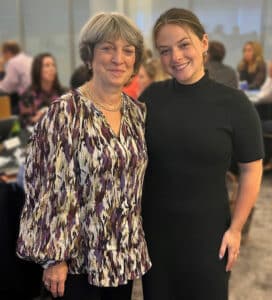Editor’s note: Before Beverly (Bev) Flaxington founded The Collaborative in 1995, a training, coaching and consulting firm that focuses on building businesses in the financial services industry, she ran the retirement group and institutional sales at John Hancock. She jumped into the C-suite when several consulting clients needed more assistance, by serving as interim head of sales for a group at Thomson Financial, interim COO at Boston Advisors, and interim head of relationship managers at a custodian. Bev is also an author, grad-school professor, patent holder, certified hypnotherapist, certified hypnosis trainer and Reiki Master.
Jerilyn Klein: What got you interested in corporate consulting and what fueled your entrepreneurial spirit? And what lessons did you learn early in your career that you still use today?
Beverly Flaxington: In graduate school, I really got hooked on the idea of being an outsider helping others when a professor took us into businesses to look at their finances and market plans. Then during my corporate journey, I kept getting thrown into new things. I felt like, boy, this is really my gift to take something and figure out how to make it work — including figuring out new roles to put people in.
The biggest lesson I learned, honestly, is that people are at the heart of everything. I know that sounds so basic, but in business it was always about the goals. We didn’t, in my view, talk enough about how we help people get there, how we help them work together, or how we help them see their own strengths or areas for improvement. At one point, my colleagues drew and put a sign outside my office that said, “The doctor is in.”
Klein: You work with advisors in RIA firms, broker-dealers and wirehouses. What common struggles do they face in building their businesses across these different channels and what’s different?
Flaxington: Very few people in our business are ever taught management skills, really good leadership skills, or how to run a business. Most people get into an advisory role through the finance track and, unfortunately, we still don’t embed much of this other training into the education process. Although advisors often love what they do and are experts at what they do, nobody has ever shown them how to be a really good coach, how to give team members feedback, how to bring a team together, how to influence. No matter where we see an advisor sitting, that is consistent across the industry.
The biggest differences have to do with decision-making and accountability. In the larger firms, there is structure in place. There are certain elements that they want all of their advisors to adhere to and there are restrictions, but there’s also depth of resources. So, loads of people are around to help you with different aspects. When you’re independent, you have the ability to make whatever decisions you want to make, within compliance guidelines; you truly are this business owner entrepreneur. But you don’t have as much built-in access for help. Also in an RIA, you decide, “Here’s our culture, here’s the sort of firm we want to create,” and you go out and find those sorts of people. So that freedom piece to really handpick a team is a little bit stronger with an RIA, assuming you can find the right people.
Klein: How are firms adapting to industry consolidation?
Flaxington: We have a large client right now that’s struggling with it. They brought a lot of independent advisors onto their firm, changed their name; it’s a mishmash of “how we work” and “what we do.” Trying to pull everybody together and getting them to be consistent in the way they’re doing things is challenging. There’s always some sort of structural constraints, but just how extreme depends on where you’re an advisor.
Klein: As RIA firms get larger, are some of the smaller firms joining them facing similar struggles that advisors might experience at the wirehouses or large independent broker-dealers?
Flaxington: Without a doubt. As you know, the trend is to go to an aggregator or join a platform provider or merge with somebody else. A lot of independents are finding there are benefits to being affiliated with a much larger firm, including all of that infrastructure, scale and succession. Yet it also can really change your culture and the way you’ve done things before, so there’s a lot of inherent challenges. I think we fundamentally overlook, again, the people component. We just kind of assume, “Okay, so now you’re part of this team, let’s go forward.” But wait a minute: You’re changing everything that you’re asking somebody to do. You need to help them with how to navigate that.
Klein: How do you do that?
Flaxington: A lot of it really comes down to trying to understand what made that firm or solo advisor successful in the first place, and what sort of cultural pieces are important to hold on to. But it’s important to also show them, “You made this decision for a reason and here’s how you can leverage what you now have access to, to be better for your clients.” And you can’t tell highly successful people they’ve done things wrong — you have to show them how to leverage what they’ve done well and how to take advantage of other things that could make them even better.
Klein: What are the biggest challenges you’ve seen among advisors who are running their own businesses?
Flaxington: Identifying the right person for the team or firm; bringing that person in and really giving them clarity about expectations, how they’re going to be measured; and then, the development piece.
A book I use in one of the graduate courses I teach [at Suffolk University], “It’s the Manager,” from Gallup, says that 70% of a team’s success is linked to the manager. A lot of times, advisors think, “Hey, I’ve got a group of great people, let them do what they’re good at.” But you’ve got a 30% chance of that working if you’re not taking a pretty proactive approach.

The other piece is not having a clear, differentiated story about who we are, what success looks like to us and where we’re trying to go together. I think a lot of assumptions get made that team members know what they need to do, know why this firm is different. You really do have to create a situation where people get excited about who you are and where you’re trying to go, so that they’ll want to be part of it. It’s also important to have your story developed because this is a crowded market. If you don’t have a way to talk about why working with you is important, special, different, what it feels like and how you think about it, then you’re going to have a really hard time standing out.
Additional Reading: A Taboo Topic Advisors Need to Talk About
Klein: Any other challenges for those running a business?
Flaxington: People have business plans, they rarely have growth plans. They know they want to grow, but they haven’t written down anything. They don’t have the steps, the measurements. Having some sort of a plan of what are you going to do, where are you going to go, and how are you going to get there is so critical — and it gets missed all the time.
Klein: Can you share a particular problem you’ve came across and how you helped these clients?
Flaxington: Every time you add or remove someone, it changes the dynamics of the team. I’ve had cases where a team that is doing well brings in another support person who is good at what they do but it’s nobody’s job to make sure they’re focused on something that isn’t redundant or that something isn’t getting missed. So, you start the finger-pointing, or thinking you hired the wrong person, or you that you need to train them in a certain area. Instead, that ability to pull the team back and say, “What are we trying to accomplish here? Where are obstacles?” and really helping them see where things are getting dropped — that’s key.
Another issue we frequently get involved with is helping an advisor understand how to get more of their team involved in growth. One of our large clients has a goal of getting every person in the firm to feel like they have ownership for growth. But you can’t just say to employees, “Tell all your friends about us” — you have to help them with how do they share the story. They think, “I don’t want to be salesy to my friends at a cocktail party this weekend.” So how do you do it in a way that is comfortable? Senior advisors think it’s just going to happen, because for them it does — they just talk to people. But for somebody who doesn’t have that sort of background or confidence, it takes training and guidance.
Klein: Do you also get involved with pay incentives, such as ESOPs or other ownership structures for staff, to help motivate growth?
Flaxington: We get involved from the perspective of helping them set goals about that they’re trying to accomplish. How you do ownership sharing is a huge focus, even in the larger firms. Do you simply compensate somebody for referring a new piece of business? Do they earn ownership based on only revenue, or do they earn it on overall contribution? This is a constant topic, along with career-pathing: How do you help somebody develop to get to that next step? Does everybody want to be a manager? Compensation and career pathing come up in almost every single conversation that we have with advisors.
Klein: Can you share an example of a client whom you’ve helped with compensation?
Flaxington: Inside one of the larger firms I have a team whose patriarch is the dad of a couple of the senior people on the team. He was frustrated that his children were not taking more ownership, more responsibility. His perspective: “They want more equity, but I don’t want to give it to them until I see them take more responsibility.” Their perspective: “Why would I take more responsibility when I don’t have a larger equity piece?”
We had to sit down and look at the fact that these are not two separate discussions. My approach is always, “How can you get to your goal but in a way that feels fair to the people that you are asking to join you on this journey?” They have to know what they’re expected to accomplish and what happens when they get there.
Klein: What milestones did this client put in place for this journey?
Flaxington: Most of the time, as in this case, it’s first going to have some sort of growth component: How can we incent them to look more deeply at existing clients and extend those relationships, or make additional introductions? Second, they want to do some things around client experience. Let’s say we all agree that every client over a certain amount should have an updated plan once a year. So, then it’s tracking whether they’re doing that. Then there is what I call the “communication and contribution” piece: Is somebody going to bring an idea to the weekly meeting? Is it a reasonable idea? Do they have a plan for implementation?
I’m not telling [the patriarch] the percentages to give to his family team members, though I will offer my perspective. I’m giving him choices and a framework for trying to get to what he wants to achieve. I would not cast us as compensation experts.
Klein: Where can advisors find more numbers-oriented advice? Do they need a compensation expert?
Flaxington: If you’re independent, I’d say go to your custodian first. They do a lot of this sort of work and have a lot of benchmarking. They have a lot of ideas around structure. If you’re inside one of these larger firms, you need to think about this type of discussion I’m referencing and then you go to your branch management or regional director and say, “Here’s what I’m trying to accomplish. Help me with the math on what options I have.”
Klein: Tell me about the Advisor Sales Academy that The Collaborative found and manages.
Flaxington: Some years ago, I decided I needed to write a book and capture some of the things that we say over and over again to advisors. A number of people then asked me if there was another mechanism to get this intel so they didn’t have to sit down to read the book, “The Pocket Guide to Sales for Financial Advisors.” So, we took my best thinking from that book and created videos, worksheets, etc. and put them out on a platform which we call Advisor Sales Academy. Those attending our virtual training and small-group coaching also get access to the academy platform.
Klein: You’re known as “The Human Behavior Coach.” When and how did you start incorporating a human-behavior focus into your work?

Flaxington: It’s been woven into everything I’ve done, for as long as I can remember, but it hasn’t been as popular as it is now to talk about it in our business. Back in the 90s. I became certified as a hypnotherapist and went to conferences all the time to learn about brainwork and how people make decisions. The consulting firm I partnered with that really trained me on how to be a great outside consultant used behavioral profiles, so I got certified as a behavioral analyst and a values analyst. You learn so much about how behavior works — how it helps us and interrupts us. I also got certified in emotional intelligence through that firm. In my graduate teaching, I’ve been asked to teach new classes that I’ve had to create. I taught a class called “Dealing with Difficult People.”
Klein: You’ve shared your knowledge as a radio host, author, college professor, speaker. What motivates you to keep motivating others?
Flaxington: For me, it’s the amazing experience of seeing someone learn something, benefit from something. And we never know how many days and weeks and months we’re going to get, so I have a sense of urgency to try to help as many people as possible. Also, I just love this business: I guess because I come from it, I understand it. Plus, I do think you can transform a [consumer] client’s financial life. So, if I can help someone who’s in this business be able to get better at what they do, to help that transformation happen, it’s just really exciting for me.
Klein: How do you suggest advisors balance their business building with taking care of their non-business lives, including their health, in a 24/7 world?
Flaxington: You’re not going to be able to say to somebody, “Put your phone away as soon as you get home from work.” But when you sit down for dinner with family, a significant other or a friend, put your phone away so you focus on what you’re doing. Same thing when you go to the gym. I sometimes walk out on my back deck and close my eyes and breathe. It could be the busiest day, and I might do it for all of two minutes, but it’s those small things that can bring yourself back to center.

Many of us have children or elderly parents or other commitments. I foster animals, I have three kids, I have an elderly mom that needs me, too. There are not enough hours in the day, so you have to find those snippets. Put on some music, get into the song, it’s three minutes long.
Jerilyn Klein is editorial director of Rethinking65. This conversation has been edited for brevity and clarity.







